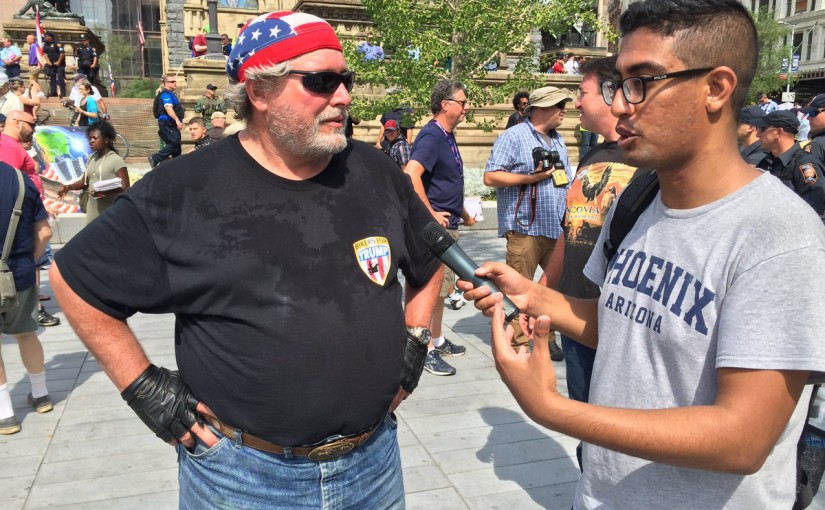It’s October 2011 in Cairo. The whole country is still going through the most tumultuous time in its recent history. A few months back a 30-year-ruling dictator was toppled by a popular revolt. And nothing remained the same afterwards.
In the midst of all that, I was juggling multiple freelance video journalism assignments here and there. The country was flooded by a stream of reporters from everywhere. The story we were part of was touching the lives of many around the world.
I was fortunate to participate in the Open Hands Initiative (OHI) and The GroundTruth Project fellowship, “Covering a Revolution” in Cairo back then. It was a simple project, yet it has had a profound impact on me, both then and now. The idea was to bring together a group of emerging American reporters and team them up with Egyptian counterparts and have them produce a special report on Egypt after the revolution.
What I learned from peers and mentors in those intense days of reporting and caffeine wasn’t just about journalism and best practices. For the first time, I felt a member of this global tribe unified by a shared interest in truth.
Journalism as a profession is not bound by nationality or religion. It’s bound by a code of ethics with the goal of serving the public interest. The lives of people are at the epicenter of what we do. Whether in print, photography, or film, we all seek to draw a character sketch or storyline that is honest and that can connect with readers and viewers.
Through the fellowship, I learned how to engage better with stories through a global lens. That means trying to include more than one perspective and emphasizing themes relevant to a variety of audiences worldwide.
Emphasizing “worldwide”, I believe we now live in a world where nationalisms, among other -isms, are trying to divide us. This dichotomy between globalism and nationalism, in my opinion, now wields significant power. The rise of anti-immigration and protectionist trade policies purported by individuals such as Republican presidential nominee Donald Trump and the pro “Brexit” supporters are indeed a manifestation of an anti-globalist sentiment. These phenomena are cashing in on perceived economic frustrations caused by globalization. Such language not only hurts economies, but also seeks to destroy the cultural and social fruits of international cooperation.
Fellowships like those of OHI and The GroundTruth Project, in my opinion, are not merely about supporting journalism as a profession. They are about highlighting our shared values and what that means for creating a more peaceful and prosperous world where everyone is more globally-minded. They help promote values that we so dearly need in today’s world: openness, tolerance, humanity, understanding, and above all, empathy.
Since moving to the United States in August 2015, I’ve taken a lot of what I learned during the reporting fellowship and applied it to my work here as an Egyptian reporting on American news. With mentorship from The GroundTruth Project and reconnecting with American reporting fellow, Lauren Bohn, I’ve been able to explore and grow my understanding of the United States in such a more meaningful way.
I’ve had the opportunity to cover both the Republican and Democratic presidential nomination conventions. As I’ve observed at these conventions, there are so many shared hopes between what we fought for in Egypt in 2011 and what Americans are fighting for today: shared prosperity and opportunity.
As I talked to Bernie Sanders supporters in July outside the Democratic National Convention, I could relate to them emotionally. They were disappointed that their candidate did not win the nomination. It reminded me of what many fellow Egyptians and I went through in Egypt. Some of my Egyptian friends on Facebook were jokingly giving them advice to abandon, what some would argue as, idealism so that they don’t end up with an authoritarian who is going to threaten their very existence. For a moment, it felt as if time and space were shrinking.
Just as Egyptians had fought for a better future for themselves, so too are Americans as evidenced in the political shake-up of their presidential elections. Just as the stories of Egypt’s revolution had touched the lives of so many around the world, so too are these stories, highlighting just how much we all have in common. America, I feel you.
The views expressed in this post are those of the author and do not necessarily reflect the views or opinions of the Open Hands Initiative.
About the Author: Mohamed Abdelfattah is a video journalist and documentary filmmaker. His work has been featured on Deutsche Welle TV, Al Masry Al Youm, Ahram Online, CNN and Bloomberg TV Africa. In 2011, he won an International Press Freedom Award from Canadian Journalists for Free Expression for his coverage of human rights violations in 2010. Mohamed was one of 17 emerging journalists from the United States and Egypt who participated in our “Covering a Revolution” fellowship, a cross-cultural media training program.
